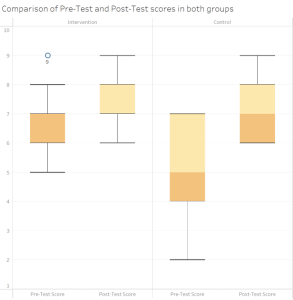Digital Vs. Traditional – Development and evaluation of an FHIR conformant computed tomography explanation application in comparison to traditional paper-based information sheets
Aim and Research Question(s)
This study developed and evaluated a prototype, called MedBuddy, to enhance patient understanding, bridging language barriers and improving informed consent in context of computed tomography (CT) procedures. The research question posed was: "What is the estimated effect size of a digital CT explanation application on knowledge gain, as measured by Pre- and Post-Test scores, compared to conventional paper-based information sheets?"
Background
Informed consent processes are hindered by literacy gaps, cultural differences, language barriers, and time constraints, which limit patient understanding and participation. Technology provides effective solutions to these challenges. Tools like multilingual eHealth applications, interactive videos, and tablet-based systems could enhance comprehension through visual aids and simplified explanations, improving recall and decision-making. [1]
Methods
A randomized controlled pilot trial evaluated the effect size of the MedBuddy application on knowledge acquisition about CT procedures. Eighteen participants were randomly assigned to the Intervention group (n=9), using MedBuddy, or the Control group (n=9), using paper-based CT information sheets. Participants completed a Pre-Test, reviewed their assigned materials, and then took a Post-Test to measure knowledge gains. The primary outcome focused on effect size within groups, while secondary outcomes included emotional responses and test duration differences. Statistical analysis assessed the significance of the observed changes.
Results and Discussion
The Control group demonstrated a significant mean score increase of 2.0 points from the Pre-Test to the Post-Test (mean: 5.2 to 7.2, median: 5 to 7; effect size: 1.8, p = 0.001). In the Intervention group, a smaller, non-significant increase of 0.5 points was observed (mean: 6.8 to 7.3, median: 7 for both tests; effect size: 0.3, p = 0.384). The Post-Test duration, significantly decreased in both groups, while emotional responses were not statistically analyzed.
Conclusion
The study’s findings were limited by a small sample size (n = 18), reducing conclusion reliability. Paper-based CT information sheets outperformed the MedBuddy prototype, likely influenced by the Intervention group’s high baseline knowledge. Future research should activate MedBuddy’s interactive features and involve larger, more diverse samples to evaluate its full potential.
References
[1] D. Vogele, O. Schöffski, K. Efinger, S. A. Schmidt, M. Beer, and D. Kildal, ‘Aufklärungserfolg, Zufriedenheit und Verbesserungsmöglichkeiten bei Computertomographie-Aufklärungen’, Radiologe, vol. 60, no. 11, pp. 1077–1084, Nov. 2020, doi: 10.1007/s00117-020-00727-w.
